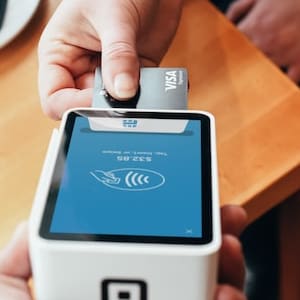pick up the tab: Idiom Meaning and Origin
What does ‘pick up the tab’ mean?
The idiom "pick up the tab" means to pay the bill or expenses for a group of people or oneself, often in a social or business setting.

Idiom Explorer
The idiom "put food on the table" means to provide the necessary income or means to support oneself and one's family.
The idiom "pony up" means to pay or give money, especially when it is expected or demanded. It is often used in a casual or slightly aggressive way to urge someone to contribute their share or fulfill their financial obligation.
The idiom "pitch in" means to join in and help or contribute to a task or activity.
The idiom "pin money" refers to a small amount of extra money that is earned for personal use or personal expenses.
The idiom "pick up what someone is putting down" means to understand or comprehend someone's message or intention, often when it is not explicitly stated. It involves perceiving and grasping the underlying meaning or subtle clues in a conversation or situation.
The idiom "pick up the threads" means to resume or continue a previous activity or conversation after a pause or interruption.
"Pick up the pieces" means to regain control or deal with the aftermath of a difficult situation or failure, often involving rebuilding or repairing what has been damaged or broken.
The idiomatic phrase "pick up on" means to notice or perceive something, often a subtle or hidden meaning or signal. It implies a keen sense of observation or understanding, indicating the ability to grasp underlying information or hints.
The idiom "pay the rent" means to meet one's financial obligations or responsibilities, especially in regard to sustaining one's livelihood or meeting basic needs. It implies fulfilling necessary obligations in order to maintain stability, similar to paying the bills or supporting oneself.
The True Cost Revealed
Despite its small size, the idiom "pick up the tab" holds a significant weight in American English. It is a colloquial expression commonly used in social contexts to describe the act of paying for someone else's expenses or bills. The phrase can be taken both literally and figuratively, depending on the situation.
Literally, "pick up the tab" refers to the physical action of taking care of a bill or settling a debt. It is often used when a group of people is sharing expenses, such as a meal at a restaurant or drinks at a bar. When someone offers to "pick up the tab," they are offering to pay the entire bill on behalf of the group, freeing the others from any monetary obligation. This is similar to the idiom "pay the bills," which means to take care of all the expenses associated with a particular situation.
Figuratively, this idiom goes beyond financial matters and delves into social etiquette and responsibility. It reflects a cultural expectation for individuals to cover the expenses of others, especially when one person has a higher social status or more significant financial means. By offering to "pick up the tab," one person assumes the role of a benefactor, displaying generosity and strengthening social bonds. This is similar to the idiom "foot the bill," which means to take full responsibility for paying the expenses of a particular event or activity.
However, "pick up the tab" can also be used metaphorically to describe taking responsibility for the consequences or repercussions of a specific event or decision. In this figurative sense, the phrase suggests accepting the burden or fallout associated with a certain action, essentially assuming accountability for the outcome. This concept is similar to the idiom "on one's bill," which means to shoulder the full responsibility or consequences of a situation without any external assistance.
As for the origin of the idiom "pick up the tab," there are various theories. Some speculate that it may have originated in the early 19th century from the practice of physically "picking up" a tavern bill, where a patron would settle the expenses by lifting the tab attached to the bar. Others believe it may have originated in the gambling world, where a gambler who incurred a debt was required to pay by lifting a particular tab off the table. The exact origins remain inconclusive, but the usage of this idiom has become firmly embedded in the American lexicon.
This idiom exemplifies elements of social dynamics, generosity, and responsibility within interpersonal relationships. It showcases the nuances of American culture, where financial matters and social customs intertwine to shape social expectations and behavior. The idiom "pick up the tab" stands as a testament to the complexity and multifaceted nature of the English language, reminding us of the intricate tapestry of idiomatic expressions that enrich our communication.
With each idiom, there is always the prospect for exploration and discovery, inviting us to unravel the fascinating intricacies of language and the cultural contexts in which they reside. Whether it's paying the bills, footing the bill, or taking on the responsibility on one's bill, idioms like "pick up the tab" provide us with a glimpse into the colorful world of language and the rich tapestry of expressions that make communication so fascinating.
Example usage
The idiom "pick up the tab" can be used in a variety of ways:
- After a delicious dinner, John generously offered to pick up the tab for everyone at the table.
- When my friend forgot their wallet, I had to pick up the tab for their movie ticket.
- During the company outing, the boss surprised everyone by picking up the tab for all the drinks at the bar.
More "Finance" idioms



